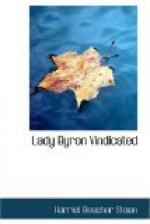CHAPTER IV. RESULTS AFTER LORD BYRON’S DEATH.
At the time of Lord Byron’s death, the English public had been so skilfully manipulated by the Byron propaganda, that the sympathy of the whole world was with him. A tide of emotion was now aroused in England by his early death—dying in the cause of Greece and liberty. There arose a general wail for him, as for a lost pleiad, not only in England, but over the whole world; a great rush of enthusiasm for his memory, to which the greatest literary men of England freely gave voice. By general consent, Lady Byron seems to have been looked upon as the only cold-hearted unsympathetic person in this general mourning.
From that time the literary world of England apparently regarded Lady Byron as a woman to whom none of the decorums, nor courtesies of ordinary womanhood, nor even the consideration belonging to common humanity, were due.
‘She that is a widow indeed, and desolate,’ has been regarded in all Christian countries as an object made sacred by the touch of God’s afflicting hand, sacred in her very helplessness; and the old Hebrew Scriptures give to the Supreme Father no dearer title than ’the widow’s God.’ But, on Lord Byron’s death, men not devoid of tenderness, men otherwise generous and of fine feeling, acquiesced in insults to his widow with an obtuseness that seems, on review, quite incredible.
Lady Byron was not only a widow, but an orphan. She had no sister for confidante; no father and mother to whom to go in her sorrows—sorrows so much deeper and darker to her than they could be to any other human being. She had neither son nor brother to uphold and protect her. On all hands it was acknowledged that, so far, there was no fault to be found in her but her utter silence. Her life was confessed to be pure, useful, charitable; and yet, in this time of her sorrow, the writers of England issued article upon article not only devoid of delicacy, but apparently injurious and insulting towards her, with a blind unconsciousness which seems astonishing.
One of the greatest literary powers of that time was the ‘Blackwood:’ the reigning monarch on that literary throne was Wilson, the lion-hearted, the brave, generous, tender poet, and, with some sad exceptions, the noble man. But Wilson had believed the story of Byron, and, by his very generosity and tenderness and pity, was betrayed into injustice.
In ‘The Noctes’ of November 1824 there is a conversation of the Noctes Club, in which North says, ’Byron and I knew each other pretty well; and I suppose there’s no harm in adding, that we appreciated each other pretty tolerably. Did you ever see his letter to me?’
The footnote to this says, ’This letter, which was PRINTED in Byron’s lifetime, was not published till 1830, when it appeared in Moore’s “Life of Byron.” It is one of the most vigorous prose compositions in the language. Byron had the highest opinion of Wilson’s genius and noble spirit.’




